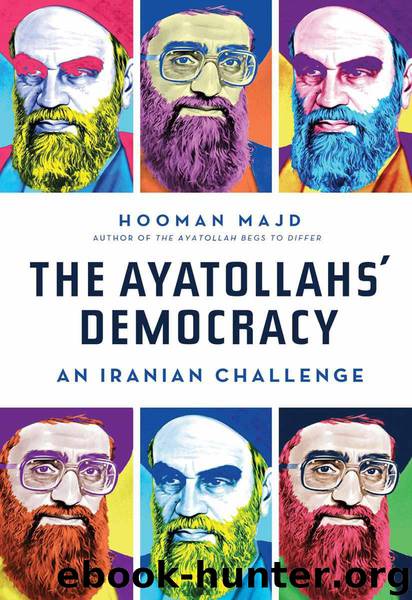The Ayatollahs' Democracy: An Iranian Challenge by Majd Hooman

Author:Majd, Hooman [Majd, Hooman]
Language: eng
Format: mobi
Publisher: W. W. Norton & Company
Published: 2010-09-19T16:00:00+00:00
AS A YOUNG CHILD I would sometimes see my father, when he was a diplomat under the last Shah, come home angry and frustrated. Often, I would glean from conversations I overheard that it was because he had had to deal with an issue that day that he felt strongly about, but one in which the United States had made the decision for Iran, or an issue that the Shah had shown a particular weakness in when it came to Iran’s national interests. Ironically, as my father became a senior diplomat, ambassador to Japan, he no longer talked about work at home, mainly, as I discovered, because the Iranian government had thoroughly wired the homes it provided for senior officials (and undoubtedly it continues to do so). The Shah had actually started to believe, for a moment in the 1970s, that he had risen above a dependence on America and the West, evidenced in his lecturing tone when discussing their profligate ways in interviews, particularly during the oil crises. (Pro-monarchy conspiracy theorists still claim that the British and the Americans engineered the Islamic Revolution as payback to the newly bumptious Pahlavi.) Ayatollah Khomeini didn’t buy it, this independent-minded king who had visions of himself as the heir to Cyrus the Great’s legacy, but some of the Shah’s men did, until he began calling on the American ambassador to Tehran for advice when Khomeini’s revolution showed signs of taking hold. I don’t think my father ever bought it fully either, for he still grew visibly agitated by issues of foreign policy, the corruption of the Iranian elite, and the Shah’s tendency to bend to the will of American presidents; when the revolution came, my father was hesitant only because of his great dislike of organized religion and the politicized clergy, not because of a great love for the Shah’s regime.
When I talk to my father today, and tell him stories about my meetings with current Iranian ambassadors and other officials, I see in him an envy, not for their positions or jobs, but for the way they behave and for their ability to act completely in the interests of their country, without regard for whether a greater power might object. And he, like so many of the old guard who detest the rule of the mullahs, expresses an (often reluctant) admiration for a government that has been able to accomplish so much in terms of its influence and power on the world stage. To the astonishment of those like my father though, it took what they considered the un-or under-educated, the provincial and unsophisticated, those who never succumbed to the temptations or the conventions of Western society, to turn Iranian dreams of past glory into realistic ones for the future. And sometimes even those most opposed to the likes of Ahmadinejad can reluctantly admire him for his in-your-face por-roo’ee, cheekiness or impudence, in the face of foreign attempts to control Iran or its development.
In late 2009, a few days after the
Download
This site does not store any files on its server. We only index and link to content provided by other sites. Please contact the content providers to delete copyright contents if any and email us, we'll remove relevant links or contents immediately.
| Africa | Americas |
| Arctic & Antarctica | Asia |
| Australia & Oceania | Europe |
| Middle East | Russia |
| United States | World |
| Ancient Civilizations | Military |
| Historical Study & Educational Resources |
Empire of the Sikhs by Patwant Singh(23069)
The Wind in My Hair by Masih Alinejad(5085)
Rise and Kill First by Ronen Bergman(4776)
The Templars by Dan Jones(4681)
The Rape of Nanking by Iris Chang(4200)
12 Strong by Doug Stanton(3541)
Blood and Sand by Alex Von Tunzelmann(3192)
Babylon's Ark by Lawrence Anthony(2671)
The History of Jihad: From Muhammad to ISIS by Spencer Robert(2618)
No Room for Small Dreams by Shimon Peres(2362)
The Turkish Psychedelic Explosion by Daniel Spicer(2352)
Inside the Middle East by Avi Melamed(2349)
Gideon's Spies: The Secret History of the Mossad by Gordon Thomas(2337)
Arabs by Eugene Rogan(2292)
The First Muslim The Story of Muhammad by Lesley Hazleton(2263)
Come, Tell Me How You Live by Mallowan Agatha Christie(2246)
Bus on Jaffa Road by Mike Kelly(2150)
1453 by Roger Crowley(2022)
Kabul 1841-42: Battle Story by Edmund Yorke(2020)
